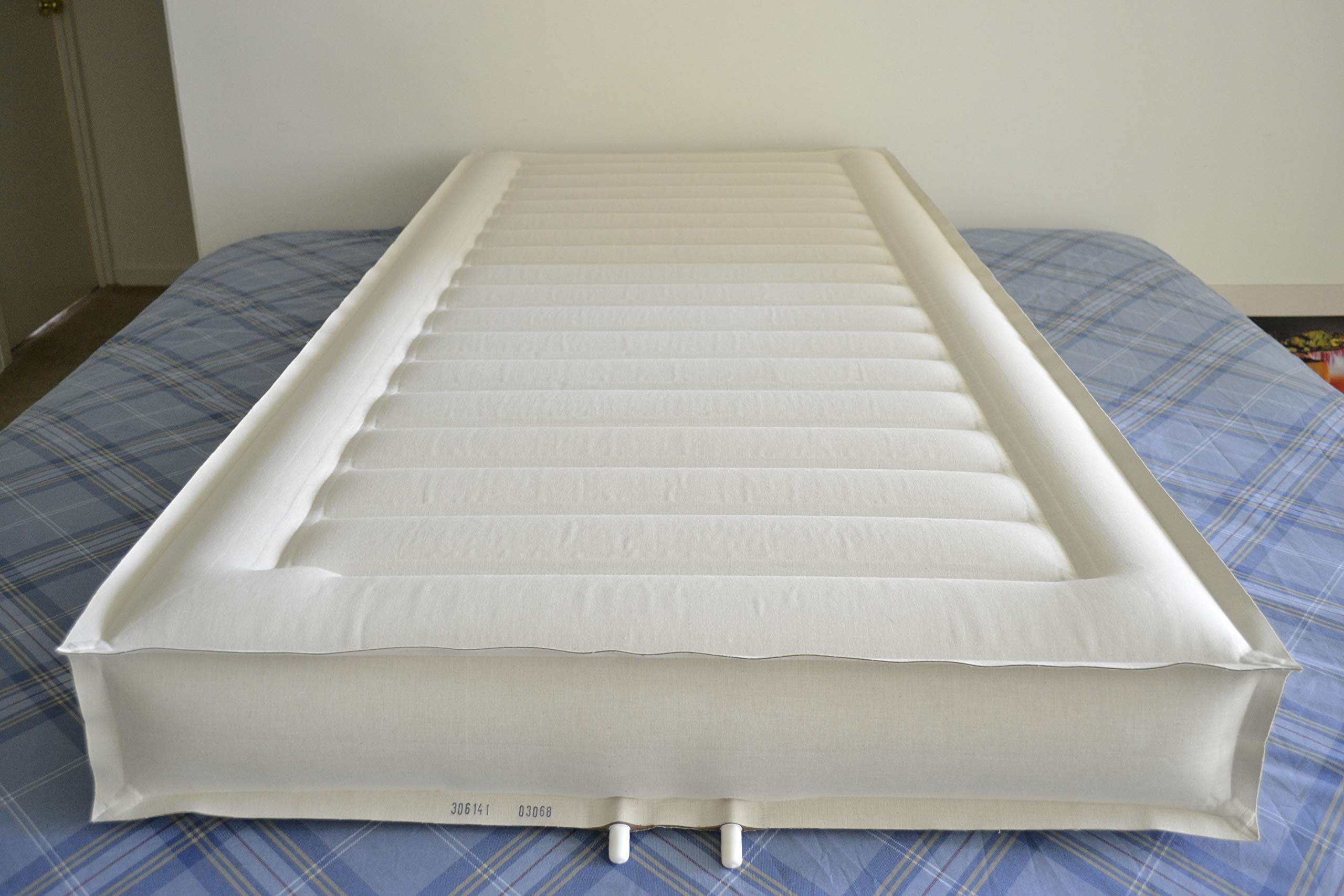Home>Interior Design>How Sharing Your Bed With Your Pet Compromises Not Just Sleep, But Your Health, Too


Interior Design
How Sharing Your Bed With Your Pet Compromises Not Just Sleep, But Your Health, Too
Modified: January 9, 2024
Discover how sharing your bed with your pet can compromise your sleep and overall health. Get expert tips on creating an interior design that prioritizes both comfort and hygiene.
(Many of the links in this article redirect to a specific reviewed product. Your purchase of these products through affiliate links helps to generate commission for Storables.com, at no extra cost. Learn more)
Introduction
Many pet owners enjoy the companionship and comfort that comes with sharing their bed with their beloved furry friends. However, while it may seem harmless and even comforting to have your pet snuggled up beside you at night, the reality is that it can have a significant impact on both your sleep quality and overall health. In this article, we will explore the various ways in which sharing your bed with your pet can compromise not just your sleep, but your health as well.
Key Takeaways:
- Sharing your bed with pets can disrupt sleep, worsen allergies, and pose a slight risk of disease transmission. Establishing boundaries, practicing good hygiene, and maintaining a consistent sleep routine can help mitigate these issues.
- While sharing a bed with pets can provide comfort, it may lead to disrupted sleep patterns and behavioral issues. Creating a calming sleep environment, providing mental and physical stimulation, and considering alternative sleeping arrangements can help maintain a healthy sleep environment for both you and your furry friend.
Impact of sharing a bed with pets on sleep quality
Sharing a bed with pets can have a profound impact on the quality of your sleep. While some individuals may find it comforting to have their furry companions close by, it is important to recognize the potential drawbacks. One of the primary issues is the disruption of sleep patterns. Pets are known to have different sleep-wake cycles than humans, often resulting in them moving around, scratching, or even vocalizing during the night. These movements and noises can interrupt your sleep, leading to fragmented and less restful nights.
Additionally, having pets in bed can also increase the likelihood of developing sleep disorders such as insomnia or sleep apnea. Animals, especially dogs, tend to have their own sleep disturbances or disorders, which can easily transfer to their human bedmates. For example, certain breeds of dogs are prone to snoring or sleep apnea, which can disrupt your sleep and lead to daytime fatigue and exhaustion.
Moreover, sharing a bed with pets can exacerbate existing allergies or respiratory problems. Pets can bring allergens like pet dander, dust, pollen, or even fleas into the sleeping environment. This can trigger allergic reactions in sensitive individuals, leading to nasal congestion, sneezing, itchy eyes, and respiratory discomfort. People with asthma or other respiratory conditions may experience even more severe symptoms and may find it particularly challenging to get a good night’s sleep.
Another important consideration when sharing your bed with pets is the increased risk of disease transmission. While it is rare, certain diseases can be passed between animals and humans. For example, pets can carry parasites like fleas or ticks, and these parasites can bite humans, potentially transmitting diseases such as Lyme disease. Additionally, pets can also transmit certain bacterial infections through scratches or bites, putting you at risk for bacterial skin infections or other illnesses.
Disrupted sleep patterns and sleep disorders
Sharing your bed with pets can significantly disrupt your sleep patterns, leading to sleep disorders and daytime fatigue. One of the primary reasons for this is the difference in sleep-wake cycles between humans and animals. While humans generally have a consolidated period of sleep during the night, pets may have different sleep patterns, characterized by shorter sleep cycles and intermittent awakenings.
For example, dogs are polyphasic sleepers, meaning they have multiple sleep episodes throughout the day and night. They are more likely to wake up, move around, and even bark or whimper during the night. Cats, on the other hand, are crepuscular animals, meaning they are most active during twilight hours, which can clash with human sleep schedules. These differences in sleep patterns can disrupt your restorative sleep and keep you awake, leading to fragmented and poor-quality sleep.
Additionally, sharing a bed with pets can increase the risk of developing or worsening sleep disorders such as insomnia or sleep apnea. Pets may snore, scratch, or move around during the night, which can disturb your sleep and make it difficult to fall asleep or stay asleep. These disruptions can contribute to insomnia symptoms, including difficulty falling asleep, frequent awakenings, or waking up too early in the morning.
Moreover, certain breeds of dogs are prone to sleep disorders such as sleep apnea or sleep-disordered breathing. These conditions can involve episodes of interrupted breathing during sleep, leading to brief awakenings or decreased oxygen levels. If you are sharing a bed with a dog that has sleep apnea, their sleep disturbances can affect your own sleep quality and exacerbate daytime sleepiness and fatigue.
It is important to recognize that disrupted sleep patterns and sleep disorders not only impact your sleep quality but also have wider implications for your overall health and well-being. Chronic sleep deprivation can lead to a range of health issues, including increased risk of cardiovascular diseases, impaired cognitive function, weakened immune system, and mood disorders such as anxiety and depression.
Allergies and respiratory problems associated with sharing a bed with pets
Sharing your bed with pets can be a source of allergens and potential respiratory problems. Pets, such as dogs and cats, can carry allergens like pet dander, dust, pollen, and even fleas into the sleeping environment. These allergens can trigger allergic reactions in susceptible individuals, leading to a range of respiratory symptoms and discomfort.
Pet dander, which consists of tiny skin flakes and saliva proteins, is a common allergen that can cause allergic rhinitis, also known as hay fever. Symptoms of allergic rhinitis include nasal congestion, sneezing, runny nose, postnasal drip, and itchy or watery eyes. These symptoms can significantly disrupt sleep and make it difficult to get a restful night’s sleep.
In addition to pet dander, pets can also introduce other allergens into the sleeping environment. For example, dogs that spend time outdoors may bring in pollen or outdoor allergens on their fur, which can affect individuals with pollen allergies. Similarly, pets can carry dust or other airborne allergens into the bed, exacerbating symptoms in individuals with dust mite allergies.
Sharing a bed with pets can be particularly problematic for individuals with asthma or other respiratory conditions. The presence of pet allergens in the sleeping environment can trigger asthma symptoms, including wheezing, coughing, chest tightness, and shortness of breath. These symptoms can worsen at night when lying down, leading to disturbed sleep and increased respiratory distress.
Furthermore, pets can also bring fleas, ticks, or other parasites into the bed, increasing the risk of insect bites. Flea bites, in particular, can cause intense itching and discomfort, leading to disrupted sleep and subsequent skin infections due to scratching.
If you have known allergies or respiratory conditions, it is advisable to take precautions when sharing your bed with pets. Regularly grooming and bathing your pet, keeping them off the bed, and using allergen-proof bedding covers can help reduce exposure to allergens and minimize the risk of respiratory problems. Additionally, maintaining a clean sleeping environment and regularly washing bedding can also help eliminate allergens that may accumulate over time.
Consider setting up a separate sleeping space for your pet to ensure better sleep quality and reduce the risk of allergies and infections.
Increased risk of disease transmission
While the risk is relatively low, sharing your bed with pets does come with a slightly increased risk of disease transmission. Although uncommon, certain diseases can be passed between animals and humans, especially through close contact and exposure to bodily fluids or parasites.
One common example is the transmission of zoonotic diseases. Zoonotic diseases are infectious diseases that can be transmitted between animals and humans. For instance, pets can carry parasites like fleas or ticks, which can bite humans and potentially transmit diseases such as Lyme disease or Rocky Mountain spotted fever. These diseases can cause a range of symptoms, including fever, fatigue, joint and muscle pain, and in some cases, even serious complications if left untreated.
In addition to parasites, pets can also transmit certain bacterial infections through scratches or bites. For instance, a scratch or bite from an infected animal can lead to bacterial skin infections, such as cellulitis or impetigo. These infections can be uncomfortable, require medical treatment, and disrupt your sleep and overall well-being.
It is important to note that the risk of disease transmission is generally low, especially if your pet is in good health, up to date on vaccinations, and regularly examined by a veterinarian. However, individuals with weakened immune systems, such as elderly individuals, young children, or those with certain medical conditions, may be more susceptible to infections and should take extra precautions when sharing their bed with pets.
To help mitigate the risk of disease transmission, it is advisable to maintain good hygiene practices. Regularly wash your hands after handling your pets, especially before touching your face or eating. Keep your pets up to date on vaccinations, flea, and tick prevention, and ensure they receive regular veterinary check-ups to monitor their health. By taking these precautions, you can minimize the risk of disease transmission and continue to enjoy the companionship of your pets without compromising your health.
Read more: Best Raised Bed Soil For Your Pet Plants
Behavioral issues and disrupted sleep routines
Sharing a bed with pets can sometimes lead to behavioral issues and disrupted sleep routines, affecting both the pet and their human bedmate. While pets can provide comfort and companionship, certain habits and behaviors can interfere with a peaceful night’s sleep.
For example, some pets may have restless or excessive movements during the night. Dogs may scratch themselves, pace around, or even jump on and off the bed. Cats may be more prone to nocturnal activity, engaging in play or “zoomies” during the nighttime hours. These behaviors can disrupt your sleep, causing frequent awakenings and compromising the overall quality of your rest.
Furthermore, pets may also exhibit attention-seeking behaviors or demand extra comfort during the night. They may paw at the covers, nudge you for attention, or even vocalize to communicate their desires. While these behaviors may be endearing and heartwarming, they can be disruptive and prevent you from getting the uninterrupted sleep you need.
In addition to behavioral issues, sharing a bed with pets can also disrupt sleep routines. Pets, especially dogs, thrive on routine and may rely on consistent sleep schedules to maintain their overall well-being. However, when sharing a bed, it can be tempting for both you and your pet to deviate from routine sleep patterns. This can lead to irregular bedtimes, inconsistent wake-up times, and disrupted sleep-wake cycles for both you and your furry friend.
Over time, these disruptions to sleep routines can have a negative impact on your overall sleep quality, making it challenging to establish regular and restful sleep patterns. Additionally, if your pet becomes reliant on sleeping in your bed, it may result in separation anxiety or difficulty sleeping independently, which can further exacerbate issues with disrupted sleep routines.
To address these behavioral issues and disrupted sleep routines, it is important to create boundaries and establish a consistent sleep routine for both you and your pet. Consider providing a comfortable and designated sleeping area for your pet nearby, such as a pet bed or crate in your bedroom. This can help satisfy their need for closeness while still maintaining some separation and reducing sleep disruptions.
Additionally, incorporating regular exercise and playtime into your pet’s daily routine can help tire them out and promote better sleep habits. Providing mental stimulation and engaging activities during the day can also help alleviate restlessness and reduce attention-seeking behaviors at night.
By addressing behavioral issues and establishing consistent sleep routines, you can create a balance between sharing your bed with your pet and ensuring restful nights for both of you.
Strategies for maintaining a healthy sleep environment with pets
While sharing a bed with your pet can be a comforting and enjoyable experience, it is essential to prioritize your sleep quality and overall health. Here are some strategies to maintain a healthy sleep environment when sharing your bed with pets:
- Establish boundaries: Create designated sleeping areas for both yourself and your pet. Consider providing a comfortable pet bed or crate in your bedroom where your pet can sleep nearby without being directly in your bed.
- Practice good hygiene: Regularly groom and bathe your pet to minimize allergens and keep their fur clean. Wash your bedding regularly to eliminate pet dander, dust, and other allergens that may accumulate over time.
- Invest in allergen-proof bedding covers: Use hypoallergenic mattress and pillow covers to protect against allergens like pet dander, dust mites, and pollen. These covers can help reduce the risk of allergic reactions and respiratory discomfort.
- Keep up with pet healthcare: Ensure that your pet is up to date on vaccinations, flea and tick prevention, and regular veterinary check-ups. Regular veterinary care can help detect and address any potential health issues that could affect both your pet and you.
- Establish a consistent sleep routine: Maintain regular bedtimes and wake-up times for both you and your pet. Consistency helps regulate sleep-wake cycles and promotes better sleep quality for both of you.
- Provide mental and physical stimulation: Engage your pet in regular exercise and playtime during the day to tire them out and promote better sleep habits. Mental stimulation through games, puzzles, and interactive toys can also help alleviate restlessness and reduce nighttime activity.
- Create a calming sleep environment: Keep the bedroom dark, quiet, and at a comfortable temperature. Use white noise machines or calming music to drown out any disruptive noises that may disturb your sleep or your pet’s sleep.
- Train your pet to sleep independently: If you prefer not to share your bed with your pet, gradually transition them to their own sleeping area over time. Use positive reinforcement training techniques to encourage them to sleep independently.
- Consider alternative sleeping arrangements: If sharing a bed with your pet consistently disrupts your sleep, you may want to explore other options, such as using a separate guest bed for your pet or allowing them to sleep in a nearby room.
Remember, every pet and individual is unique, and what works for one person may not work for another. It’s essential to find a balance that suits both your needs and your pet’s needs. By implementing these strategies, you can enjoy the companionship of your pets while still achieving the quality sleep necessary for your health and well-being.
Conclusion
Sharing your bed with your pet can be a source of comfort and companionship, but it’s important to recognize the potential impact on your sleep quality and overall health. While some individuals may not experience any issues, many people find that sharing a bed with pets can lead to disrupted sleep patterns, increased allergies and respiratory problems, an elevated risk of disease transmission, and behavioral issues that can disturb sleep routines.
To maintain a healthy sleep environment when sharing your bed with pets, it’s crucial to establish boundaries, practice good hygiene, invest in allergen-proof bedding covers, keep up with pet healthcare, and create a consistent sleep routine for both you and your furry friend. Providing mental and physical stimulation for your pet, creating a calming sleep environment in the bedroom, and considering alternative sleeping arrangements when necessary are other strategies that can contribute to a healthier sleep environment for all.
Ultimately, finding a balance between enjoying the company of your pets and ensuring restful nights can be achieved by understanding your pet’s needs and adjusting your sleeping arrangements accordingly. It’s essential to prioritize your sleep quality and overall health, as chronic sleep disruptions can lead to a range of health issues.
Remember, every pet-owner relationship is unique, and what works for one person may not work for another. It’s important to assess your own sleep needs and evaluate how sharing a bed with your pet impacts your daily life. By implementing the strategies outlined in this article and being attuned to your pet’s behavior and health, you can create a sleep environment that nurtures your well-being while still enjoying the special bond you share with your furry companion.
Frequently Asked Questions about How Sharing Your Bed With Your Pet Compromises Not Just Sleep, But Your Health, Too
Was this page helpful?
At Storables.com, we guarantee accurate and reliable information. Our content, validated by Expert Board Contributors, is crafted following stringent Editorial Policies. We're committed to providing you with well-researched, expert-backed insights for all your informational needs.















0 thoughts on “How Sharing Your Bed With Your Pet Compromises Not Just Sleep, But Your Health, Too”